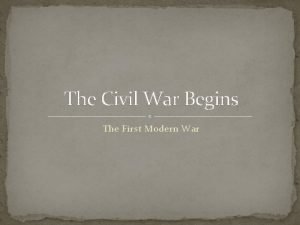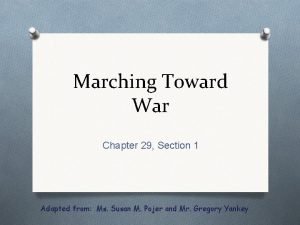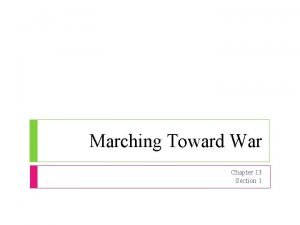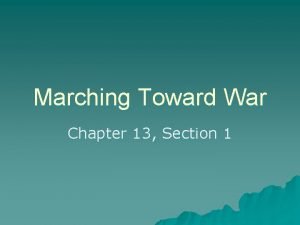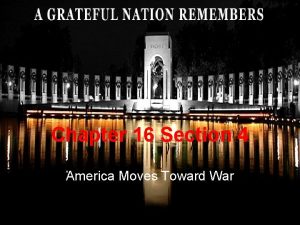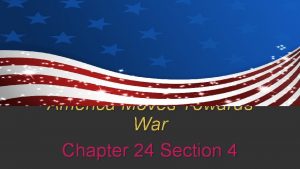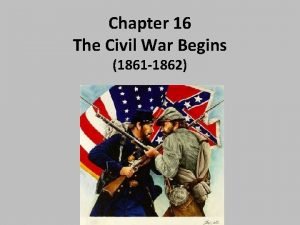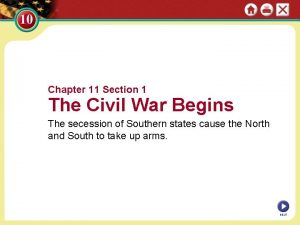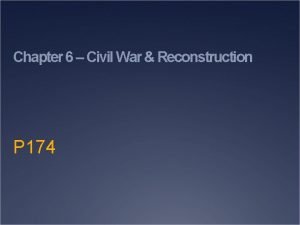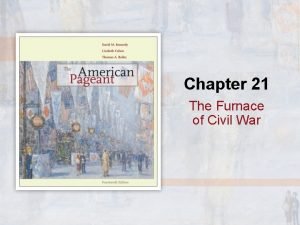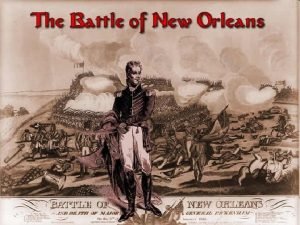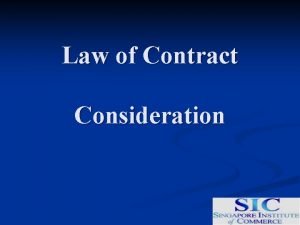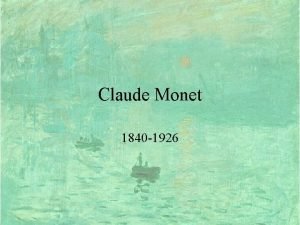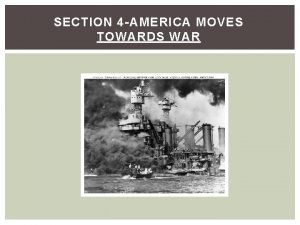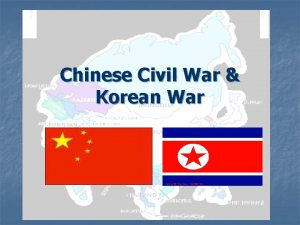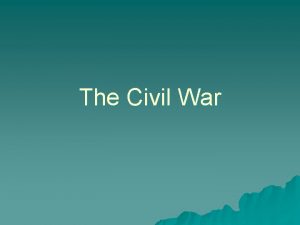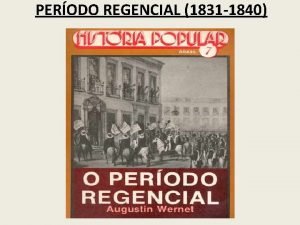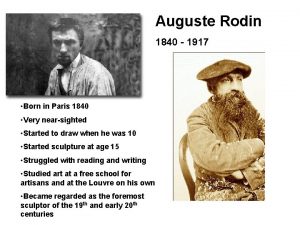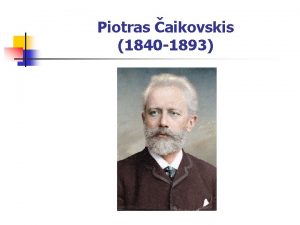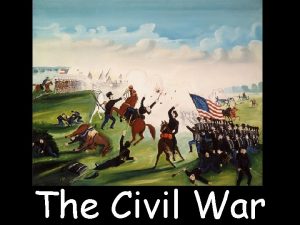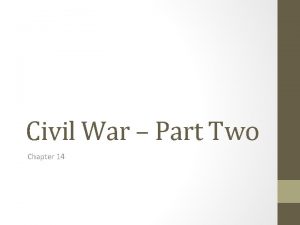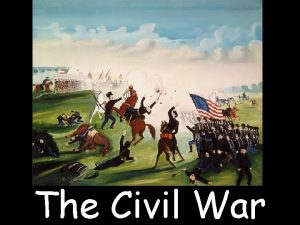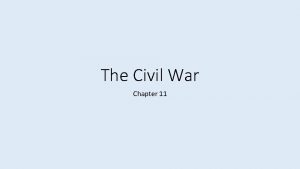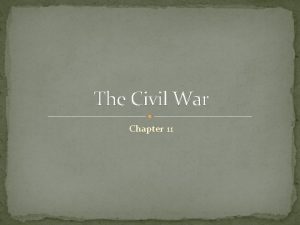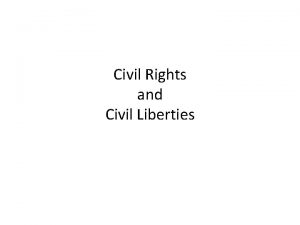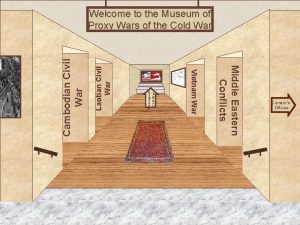US HISTORY Chapter 16 Toward Civil War 1840




















- Slides: 20

US HISTORY Chapter 16 Toward Civil War 1840 -1861

Lesson 1 – The Search for Compromise n n n Missouri Compromise (1820) -- kept number of Compromise slave states and free states equal, BUT only affected states from LA Purchase Mexican Cession (1848) -- added parts of CA, Cession NV, AZ, NM, UT, & CO = are they free or slave? Wilmot Proviso -- bill in Congress wanted to Proviso outlaw slavery in all territory gained from Mexico, never became law

Lesson 1 – The Search for Compromise n California Statehood – Statehood n (1849) CA applies for statehood as free state…Senator John C. Calhoun (SC) says if this Calhoun happens the South would leave the Union Great Compromiser -- Compromiser Senator Henry Clay…developed the Clay Compromise of 1850

Lesson 1 – The Search for Compromise n Compromise of 1850 q q q 1) California joins Union as free state 1) 2) New Mexico & Utah become territories w/ popular sovereignty 2) 3) pay Texas for giving up territory to New Mexico 3) 4) end slave trade (not slavery) in DC 4) 5) form a strict fugitive slave law 5)

Lesson 1 – The Search for n Fugitive Slave. Compromise Act q q q Passed as a part of the Compromise of 1850 Required all citizens to help catch runaway slaves Many African. Americans who were legally free or had enjoyed years of freedom were captured & taken to the South

Lesson 1 – The Search for Compromise n The Kansas-Nebraska Act q q Passed in 1854 Created two territories called Kansas & Nebraska Both territories were north of the 36° 30’ line (MO Comp) so they should have been free. . . instead, they had popular sovereignty Pro-slavery and Anti-slavery forces raced to the area

Lesson 1 – The Search for Compromise n Bleeding Kansas q q Abolitionists move in and form the city of Lawrence, Kansas Anti-slavery settlers outnumbered pro-slavery ones hundreds of border ruffians cross the border to harass antislavery settlers & vote illegally for slavery pro-slavery govt. elected, antislavery groups protest and elect their own govt.

Lesson 1 – The Search for Compromise n Bleeding Kansas q q q Violence increased between the groups May 1856 -- group of proslavery people attacked Lawrence and killed five abolitionists John Brown -- took his 5 John Brown sons and killed 5 pro-slavery settlers at Pottawatomie Creek

n Lesson 1 – The Search for Brooks-Sumner Incident Compromise 1856 - Abolitionist Senator Charles 1856 q q Sumner (MA) delivered a speech titled Sumner “The Crime Against Kansas”…spoke out against pro-slavery forces Two days later, Rep. Preston Brooks (SC) walked into Senate chamber and attacked Sumner with his cane Sumner – seriously injured, did not Sumner return to the Senate for three years, became a hero to the North Brooks – broke his cane during the Brooks attack, Southern sympathizers sent him numerous canes to replace his broken one…one cane said “Hit him again. ”

Lesson 2 – Challenges to Slavery n Republican Party q q q Formed in 1854 combination of antislavery Whigs, Democrats, & Free. Soilers Main message was that slavery should be banned from new territories Almost no support in the South, but was still able to gain control in the House of Representatives by 1858

Lesson 2 – Challenges to Slavery n Dred Scott Decision q q Dred Scott -- slave in Missouri Dred Scott his owner moved to Illinois for a period of time…moved back to Missouri where his owner died Scott decided to sue for his freedom stating since he lived in a free state (IL), he was a free man 1857 - goes to Supreme 1857 Court. . . ruled against him, said he is not a citizen & cannot sue in court

Lesson 2 – Challenges to Slavery n Lincoln-Douglas Debates q q 1858 – race for US Senator 1858 from Illinois Stephen Douglas – Democrat. . . current Senator Abraham Lincoln – Republican. . . former member of the Illinois state legislature and the US House of Representatives Held a series of seven debates across the state. . . main topic was slavery

Lesson 2 – Challenges to Slavery n Lincoln-Douglas Debates q q At the debate in Freeport, Douglas said people could exclude slavery in a territory by refusing to pass laws to protect slaveholders’ rights statement came to be known as the Freeport Doctrine (caused Douglas to lose support in the South) Election Result Douglas won a narrow victory. . . Lincoln gained a national reputation

Lesson 2 – Challenges to Slavery n Raid on Harpers Ferry q q q October 16, 1859 – John October 16, 1859 Brown led a group of men who seized the federal arsenal at Harpers Ferry, VA Brown wanted to start a slave revolt. . . planned to have slaves come to Harpers Ferry and use the weapons to form a slave army Didn’t work. . . Brown was caught, convicted of treason, and hanged

Lesson 3 – Secession and War n Election of 1860 q Democratic Party - split over issue of slavery n n q q Northern Dems – Stephen Douglas. . . supported popular Douglas sovereignty Southern Dems – John C. Breckinridge. . . keep slavery Breckinridge Constitutional Union Party – John Bell. . . took no stance on slavery Bell Republican Party – Abraham Lincoln. . . slavery should be left Lincoln alone where it’s at, BUT should be excluded from territories

Lesson 3 – Secession and War n Election of 1860 q q Lincoln (Republican) won Vote was clearly along sectional lines. . . Lincoln’s name didn’t even appear on the ballot in most Southern states Lincoln stated that slavery would not be disturbed where it already existed, but that it would not spread to new territories Southern states rejected this

Lesson 3 – Secession and War n Secession q q December 20, 1860 – December 20, 1860 South Carolina seceded from the Union February 1861 – Confederate States of America (CSA) was America formed. . . included seven states (SC, TX, LA, MS, AL, FL, GA)…elected Jefferson Davis as President Davis

SC Gov. Pickens: "Mr. President, if you don't surrender that fort at once, I'll be blowed if I don't fire. " US President Buchanan: "Oh don't! Governor Pickens, don't fire! till I get out of office. "

Lesson 3 – Secession and War n Lincoln’s Inauguration q q q March 4, 1861 7 slave states already seceded… 8 more slave states had not yet 3 Pledges n n n US would hold on to federal property (forts) in the South Union was perpetual …secession was illegal US would not be the first to attack…BUT would fight back if attacked

Lesson 3 – Secession and War n Fort Sumter q q Lincoln stated that the US would hold on to federal property (forts) in the South US tried to send in supplies to Ft. Sumter (SC)…Lincoln notified SC governor that unarmed supply ships were coming Confederates opened fire on the fort before supply ships arrived April 12, 1861 – first shots of the Civil War fired
 Toward civil war lesson 3 secession and war
Toward civil war lesson 3 secession and war Why was the civil war the first modern war
Why was the civil war the first modern war Chapter 29 marching toward war
Chapter 29 marching toward war Marching toward war
Marching toward war Marching toward war chapter 13 section 1
Marching toward war chapter 13 section 1 Atlantic charter
Atlantic charter Chapter 24 section 4 america moves toward war
Chapter 24 section 4 america moves toward war Serbian nationalist
Serbian nationalist Chapter 16 the civil war begins worksheet answers
Chapter 16 the civil war begins worksheet answers Chapter 11 section 1
Chapter 11 section 1 Chapter 6 civil war and reconstruction
Chapter 6 civil war and reconstruction The furnace of civil war
The furnace of civil war Civil rights and civil liberties webquest
Civil rights and civil liberties webquest Fired our guns and the british
Fired our guns and the british Segundo reinado 1840 a 1889
Segundo reinado 1840 a 1889 Scotson v pegg
Scotson v pegg Liebig 1840
Liebig 1840 Segundo reinado 1840 a 1889
Segundo reinado 1840 a 1889 Fue descubierto y nombrado por schoenbein en 1840
Fue descubierto y nombrado por schoenbein en 1840 Snídaně v trávě monet
Snídaně v trávě monet America moves toward war section 4
America moves toward war section 4

